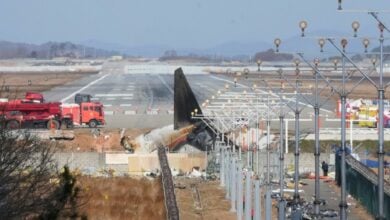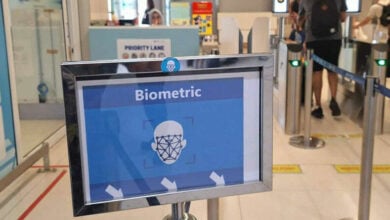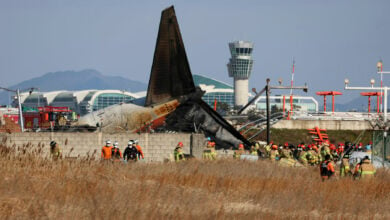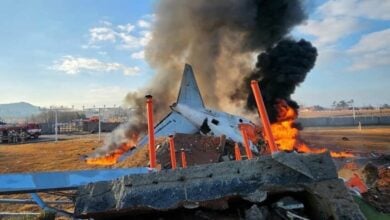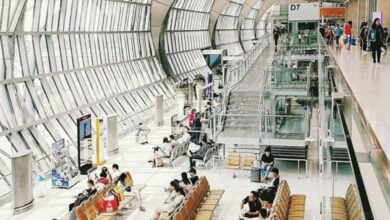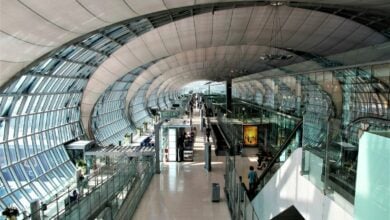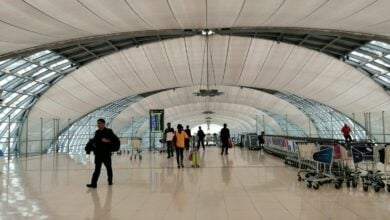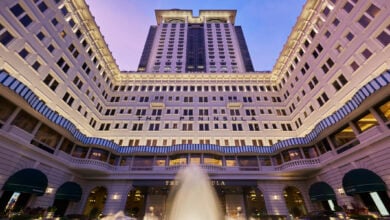World News
Explore the latest global news with The Thaiger’s World News page, your comprehensive source for international updates. We’ve got breaking news, insightful analysis, and exclusive stories from around the globe, covering politics, business, technology, and culture. Stay informed about the world’s most pressing issues, emerging trends, and influential events, as well as updates on travel, lifestyle, and entertainment.
The Thaiger is your go-to platform for staying connected with the ever-changing world we live in. To keep up with the most reliable international news source, subscribe to our newsletter and follow us on social media.
-
 Sponsored
Sponsored Best social media marketing tools to boost your online presence (2025)
Social media... so important for your business, yet so endlessly demanding. You're creating content, scheduling posts, analysing metrics, and maybe even juggling multiple social platforms. But sometimes, despite all that effort, your posts barely get any reach, no engagement, and...
-

Leicester City helicopter crash inquiry begins
A long-awaited inquiry has been launched into the crash of a Leonardo AW169 helicopter at Leicester City Football Club on October 27, 2018. The accident claimed the lives of Vichai Srivaddhanaprabha, Chairperson of King Power Group and Leicester City FC, along with two pilots and two others. The inquiry, led by Professor Catherine Mason at Leicester Town Hall, opened yesterday, January 13…
-

Thai Airways takes off at new Singapore terminal
In a major shake-up for travellers, Thai Airways is relocating its Singapore operations to Changi Airport’s Terminal 2 starting February 18. The move promises better lounge access and enhanced facilities for passengers flying the popular Bangkok-Singapore route. The switch marks the end of an era at Terminal 1, where Thai Airways operated for decades. The airline, which runs 35 weekly…
-

Noodle no more: Ramen shops fold under rising costs (video)
In an unprecedented wave of financial distress, a record number of ramen noodle eateries in Japan went belly up in 2024, unable to stomach the soaring ingredient and utility costs without raising their own prices. Research firm Teikoku Databank Ltd has revealed that insolvencies with liabilities of at least 10 million yen (approximately 2.2 million baht) surged by more than…
-

South Korea to upgrade airport structures after Jeju Air crash
South Korea is set to enhance the structures housing the antennas that facilitate landings at its airports, following the December incident where a Jeju Air aeroplane crashed after skidding off the runway. The Boeing 737-800 hit one such structure at Muan Airport, leading to a fire. The Transport Ministry has been assessing safety at airlines and airports since the crash…
-

Thailand airports boost biometrics for faster service times
The Airports of Thailand (AoT) is enhancing its biometric identification systems to expedite service times at airports. Yesterday, January 8, AoT Director Kerati Kijmanawat confirmed that this system has been implemented at six major international airports managed by AoT, including Suvarnabhumi, Don Mueang, Chiang Mai, Phuket, Mae Fah Luang Chiang Rai, and Hat Yai. However, the system currently does not…
-

Thai airports get safety and check-in boost as travellers rise by 14%
The Transport Ministry has instructed the Department of Airports (DoA) to enhance measures in support of travellers following more than 14% rise in passenger numbers over the new year period. Deputy Minister Manaporn Charoensri announced yesterday, January 7, that from December 27 to January 2, the DoA recorded 319,275 passengers, reflecting a 14.12% increase compared to the previous year. The…
-

Thai AirAsia crowned Thailand’s punctuality king – again
Thai AirAsia has soared above the competition once more, retaining its title as Thailand’s most on-time airline and securing fifth place in Cirium’s prestigious list of top 10 on-time airlines in the Asia-Pacific region. With a punctuality rate of 77.46%, it’s the only Thai carrier to earn a spot in the rankings. CEO Santisuk Klongchaiya hailed the achievement as a…
-

Jeju Air plane crash death toll rises to 179, including 2 Thai women
The death toll from the Jeju Air plane crash at Muan International Airport in South Korea yesterday, December 29, has risen to 179, including two Thai women. Jeju Air flight 7C2216, which departed from Suvarnabhumi International Airport in Bangkok bound for Muan Airport in South Korea, reportedly crashed into a wall at the destination airport at around 9am yesterday. The…
-

Jeju Air flight disaster claims 28 lives in South Korea (video)
Jeju Air’s flight from Thailand tragically ended in disaster after skidding off the runway at Muan International Airport in South Korea. At least 28 people have lost their lives in the incident, as reported by prominent South Korean media. The plane, which departed from Bangkok, encountered difficulties during its landing and subsequently veered off the runway, colliding with a barrier.…
-

Thailand allows daily airport alcohol sales to boost tourism
The Prime Minister’s Office has implemented a regulation allowing the daily sale of alcoholic beverages at major international airports. This directive, detailed in the Royal Gazette on Christmas Day, became effective yesterday, December 26. The modification aims to align legal practices with the current situation, an observer noted. Prime Minister Paetongtarn Shinawatra, following the counsel of the Alcoholic Beverage Control…
-

Indian customs seize haul of weed smuggled from Bangkok
Five travellers arriving from Bangkok were busted in a brazen smuggling attempt at Mumbai’s Chhatrapati Shivaji Maharaj International Airport (CSMIA) on Christmas Day. Indian customs officials seized a staggering 26 kilogrammes of hydroponic marijuana—worth 26 Indian crores (approximately 104 million baht)—ingeniously concealed in everyday household items. Acting on a tip-off, the Indian Customs Department intercepted the suspects shortly after they…
-

Suvarnabhumi Airport passengers surprised with teddy bears on baggage carousel
Suvarnabhumi International Airport in Bangkok is celebrating Christmas by sending teddy bears along the baggage carousel as gifts for arriving passengers. The gifts are available for two days, starting yesterday, December 24, said to run through until the end of today. The Director of Suvarnabhumi Airport, Kittipong Kittikhajorn, and the spokesperson of the Transport Ministry, Kittiphon Ruayfuphan, joined forces to…
-

Teeing off diplomacy: Thailand celebrates 50 years with China
Thailand rolled out the green carpet in Pattaya for over 300 Chinese golf enthusiasts, blending sport and diplomacy in a high-profile event. The Amazing Thailand Golf Paradise 2024, held on December 19 at Siam Country Club Waterside and Rolling Hills, marked the 50th anniversary of Thai-China diplomatic relations with a swing and a celebration. Under Thailand’s specialised golf package tours,…
-

Malaysia Airlines grounds Airbus A330neo after technical issues
Malaysia Airlines has temporarily grounded its newly acquired Airbus A330neo aircraft due to technical problems, as reported by the Business Times. Following its debut flight to Melbourne, the aircraft experienced multiple technical issues, prompting the airline to take swift action. The national carrier of Malaysia received the Airbus A330neo at the end of November and has plans to acquire an…
-

Alcohol sale breaks record on Air India Express’s inaugural flight to Bangkok
Air India Express marked the launch of its new direct route from Surat in India to Bangkok with an unforgettable incident as passengers reportedly consumed the entire alcohol supply, valued at around 70,000 baht, before landing. The Indian low-cost airline announced in November that it would begin direct flights in December from Surat and Pune to Bangkok’s Suvarnabhumi International Airport,…
-

Thailand airports gear up for 18,000 flights this new year
Thailand’s airports are preparing for a bustling new year holiday season with over 18,000 flights expected to operate nationwide, marking a significant boost for the country’s aviation industry. This increase, as per the Transport Ministry, reflects the sector’s ongoing recovery and anticipated growth in the coming year. During the holiday period from today through January 2, airports across the country…
-

Thailand rolls out the red carpet for Polish tourists
Thailand has turned on the charm for Polish holidaymakers, welcoming 294 tourists on a landmark charter flight from Warsaw to Krabi. LOT Polish Airlines‘ Boeing 787-9 Dreamliner touched down at Krabi International Airport yesterday, December 19, marking a high-flying milestone in Thai-Polish tourism. This inaugural seasonal service, organised by leading tour operator ITAKA, is set to run until March 19,…
-

Plane and simple: Phuket Airport gears up for holiday rush
Phuket International Airport is bracing for a surge of holiday travellers, with up to 60,000 passengers expected daily during the festive season. Officials promise streamlined services and enhanced security to handle the crowds. The Royal Thai Police (RTP)’s Immigration Bureau, led by acting commissioner Police Lieutenant General Panumas Bunyalak, joined forces with airport director Monchai Tanode to ensure the airport…
-

Indian passengers turn Thai AirAsia plane into party zone (video)
A flight to Thailand turned into a scene of mid-air mayhem, sparking outrage online after a viral video showcased the unruly behaviour of Indian passengers. Shared by Ankit Kumar, a content creator aboard the Thai AirAsia flight, the footage reveals groups of Indian men standing in the aisle, chatting loudly, snacking, and blatantly ignoring air hostesses’ repeated requests to return…
-

Myanmar cops rescue kidnapped businessman after deadly shootout
Police in Myanmar successfully rescued a 78 year old businessman who had been abducted outside a currency exchange shop. The dramatic operation resulted in a shootout, leaving six suspects dead and significant evidence uncovered. The victim, who had not eaten since his capture, was found safe. The incident occurred at 6am on December 13, when Yan Tin Chan was kidnapped…
-

Thai film ‘Grandma’ shortlisted for 97th Academy Awards
A significant milestone for Thai cinema unfolded yesterday, December 18 as Thai film studio GDH announced that How to Make Millions Before Grandma Dies has been shortlisted for the 97th Academy Awards in the Best International Feature Film category. The film, directed by Pat Boonnitipat and penned by screenwriter Ped Thodsapon, stands out among 85 international submissions, marking a first…
-

Australian father mourns ‘perfect’ daughter lost to methanol tragedy
The devastated father of an Australian teenager who died from methanol poisoning last month in Laos has opened up about the heart-wrenching loss of his “perfect” daughter. Shaun Bowles, father of 19 year old Holly Bowles, confessed his shock when he realised she wouldn’t survive. Shaun described Holly as “everything you’d want your daughter to be.” The Aussie teenager was…
-

Death penalty sought for Korean murderer in Pattaya, Thailand
Prosecutors in South Korea are demanding the death penalty for two men accused of the chilling murder of a Korean tourist in Thailand, an act described as both premeditated and brutal. Court officials confirmed the request today, as grisly details of the crime emerged. The suspects, 39 year old Kim Hyeong Gwon and a 27 year old surnamed Lee, face…
-

Polish man sentenced for trafficking £100k of cannabis into UK
A young Polish man in the United Kingdom was sentenced to two years in a young offenders institution after pleading guilty to trafficking almost £100,000 (4.3 million baht) of cannabis into Newcastle International Airport in the North-East of England. He claimed he was coerced into the illicit operation by a threatening organised crime syndicate. On August 30, Border Force officials…
-

Thai entertainment shines at Singapore’s Asia TV Forum 2024
Thailand’s entertainment industry has made a dazzling splash at the Asia TV Forum & Market 2024 (ATF) in Singapore, proving its growing appeal on the global stage. With a vibrant showcase of films, dramas, and BL series, Thai producers left international buyers and collaborators eager for more. Held from December 3 to 6 at Marina Bay Sands, the event saw…
-

Hong Kong master’s student duped into Thai nightmare
A Hong Kong master’s student was swept into an international scam that cost her over HK$500,000 (approximately 2.2 million baht) and led her to an alarming detour to Thailand. This unprecedented case pushed Hong Kong police to seek Interpol’s help, marking the first time a victim was lured overseas. The victim, identified as K, a 22 year old student from…
-

Airline industry poised to surpass US$1 trillion despite delays
The global airline industry anticipates surpassing US$1 trillion in revenue due to record passenger numbers, despite facing significant challenges in acquiring new aircraft, according to the International Air Transport Association (IATA). Issues with Boeing and Airbus have caused delivery delays, impeding airlines‘ ability to upgrade their fleets with more efficient planes that could reduce fuel expenses while accommodating increased passenger…
-

Hong Kong hotel bills pile up: Tourism takes a hit amid dollar drama
As Hong Kong’s hospitality sector braces for the new year, a perfect storm of challenges threatens to sour the city’s tourist appeal. With a new lodging tax set to dent visitors’ wallets and geopolitical tensions on the rise, thanks to Donald Trump’s upcoming presidency, the city’s once-thriving tourist industry could face an uphill battle. From January, a 3% hotel guest…
Broke? Find employment in Southeast Asia with JobCute Thailand and SmartJob Indonesia. Rich? Invest in real estate across Asia with FazWaz Property Group or get out on a yacht anywhere with Boatcrowd. Even book medical procedures worldwide with MyMediTravel, all powered by DB Ventures.




